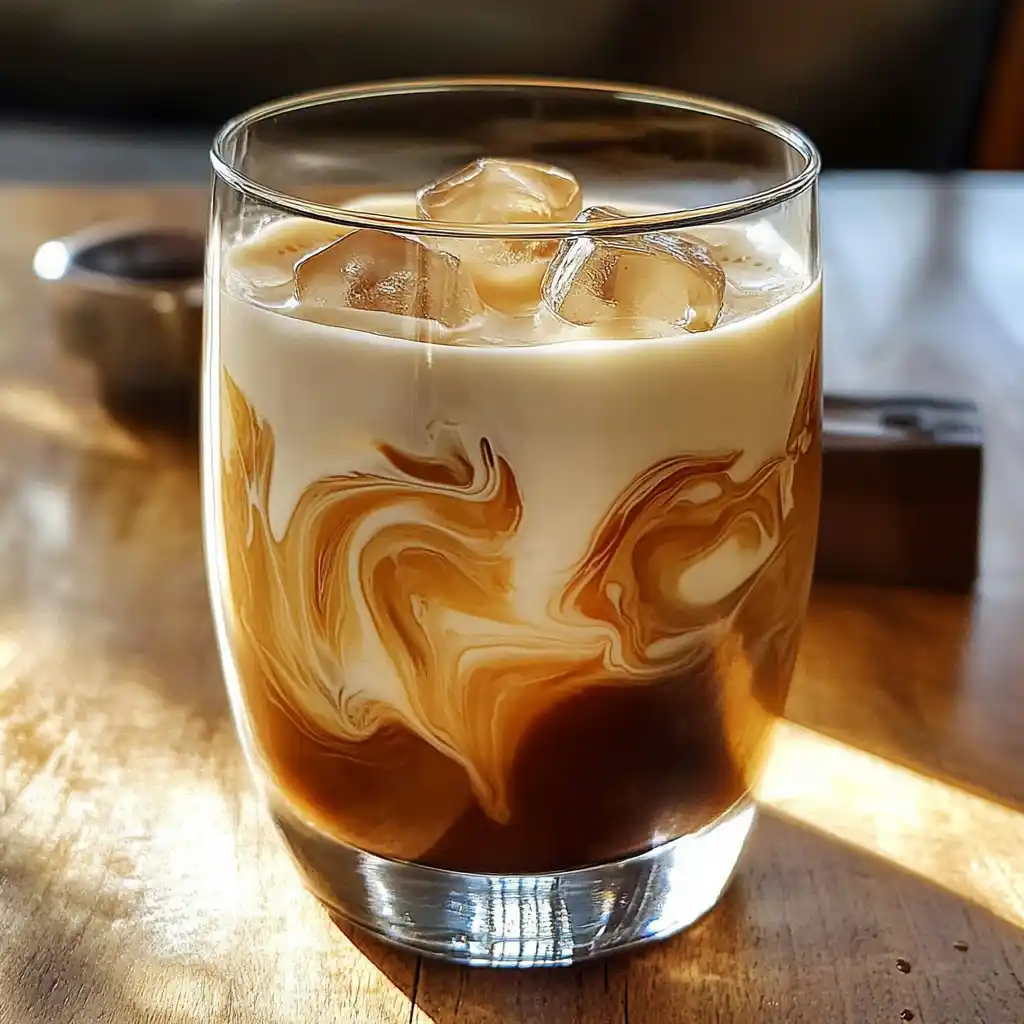Iced coffee is a cool and flavorful alternative to hot coffee, perfect for warm days or anytime you want a chilled caffeine fix. Unlike cold brew, this drink is made by brewing coffee hot and then serving it over ice, often with milk, cream, or sweeteners for extra flavor. It’s quick to make, easy to customize, and loved by coffee fans everywhere.
In this article, we’ll break down everything you need to know about iced coffee—what it is, how to make it, the best ingredients to use, and how it compares to other popular cold coffee drinks. You’ll also find recipe ideas, expert tips, global variations, and gear recommendations for taking your coffee game to the next level.
Table of Contents
What Is Iced Coffee?
What Makes It Different from Other Coffee Drinks
Iced coffee is a refreshing way to enjoy your daily brew, especially when temperatures rise. It’s typically made by brewing coffee hot and then cooling it down by pouring it over ice. Unlike cold brew—which is steeped in cold water for hours—this method delivers a quicker, bolder result with a familiar flavor profile.
Served sweetened or black, with milk or flavored syrups, it’s a drink that easily adapts to your personal taste. Whether enjoyed at home or picked up from your favorite café, it’s one of the most versatile coffee drinks around.
How It Compares to Cold Brew and Hot Coffee
Many people think chilled coffee and cold brew are the same, but they’re actually quite different. Cold brew takes 12 to 24 hours to make and results in a smoother, less acidic drink. Traditional brewed coffee that’s served cold over ice retains its boldness and slight bitterness, offering a stronger kick in both taste and caffeine.
Here’s a side-by-side comparison:
| Feature | Iced Coffee (Brewed Hot) | Cold Brew | Hot Coffee |
|---|---|---|---|
| Brewing Time | Fast (5–10 minutes) | Slow (12–24 hours) | Fast (5–10 minutes) |
| Temperature Brewed | Hot | Cold | Hot |
| Flavor Notes | Robust, slightly bitter | Smooth, mild, low-acid | Balanced to bold |
| How It’s Served | Over ice, sometimes sweetened | Chilled, often undiluted | Piping hot |
Thanks to its speed and bold character, iced coffee remains a favorite choice for anyone who wants a chilled drink with that familiar coffeehouse punch.
How to Make Iced Coffee at Home
Step-by-Step Basic Recipe for Beginners
Making iced coffee at home is easy once you get the basics down. The key is to brew your coffee a bit stronger than usual to account for dilution from the ice. Here’s a simple go-to recipe that takes less than 10 minutes:
Ingredients:
- 1 cup freshly brewed hot coffee (strong)
- ½ cup ice cubes
- ¼ cup milk or non-dairy alternative (optional)
- 1–2 tsp sugar or flavored syrup (optional)
Instructions:
- Brew your coffee using your preferred method (drip, pour-over, French press, or even instant).
- Let it sit for 3–5 minutes to reduce the heat just enough to avoid instantly melting the ice.
- Fill a glass with ice. Add sweetener while the coffee is still warm if you’re using sugar.
- Pour the coffee over the ice.
- Stir in your milk or flavoring if desired.
- Serve immediately and enjoy!
This method gives you a quick, bold, and refreshing drink that’s easy to customize.
Different Methods: French Press, Instant, and Espresso
Let’s break down a few more ways you can make this chilled drink at home:
1. French Press Method
Great for a richer, bolder result.
- Add 2 tablespoons of coarse ground coffee per 8 oz of water.
- Brew with hot water and steep for 4 minutes.
- Press the plunger down slowly.
- Let it cool slightly, then pour over ice.
- Optional: Mix with milk or sweetener.
2. Instant Coffee Shortcut
Perfect for when you’re short on time.
- Dissolve 2 tsp of instant coffee and 1 tsp sugar in 3 tbsp warm water.
- Add 6 oz cold water and ice.
- Stir in milk or a dash of vanilla extract for added flavor.
3. Espresso Style
Ideal if you like a punchy, café-style drink.
- Brew 1–2 shots of espresso.
- Cool slightly and pour over ice.
- Mix with cold frothed milk or serve as is.
Whether you’re using a fancy espresso machine or just a kettle and a jar of instant coffee, the options are wide openYou can even discover great ideas like Vietnamese or flavored iced lattes using this Dunkin iced coffee flavor guide.
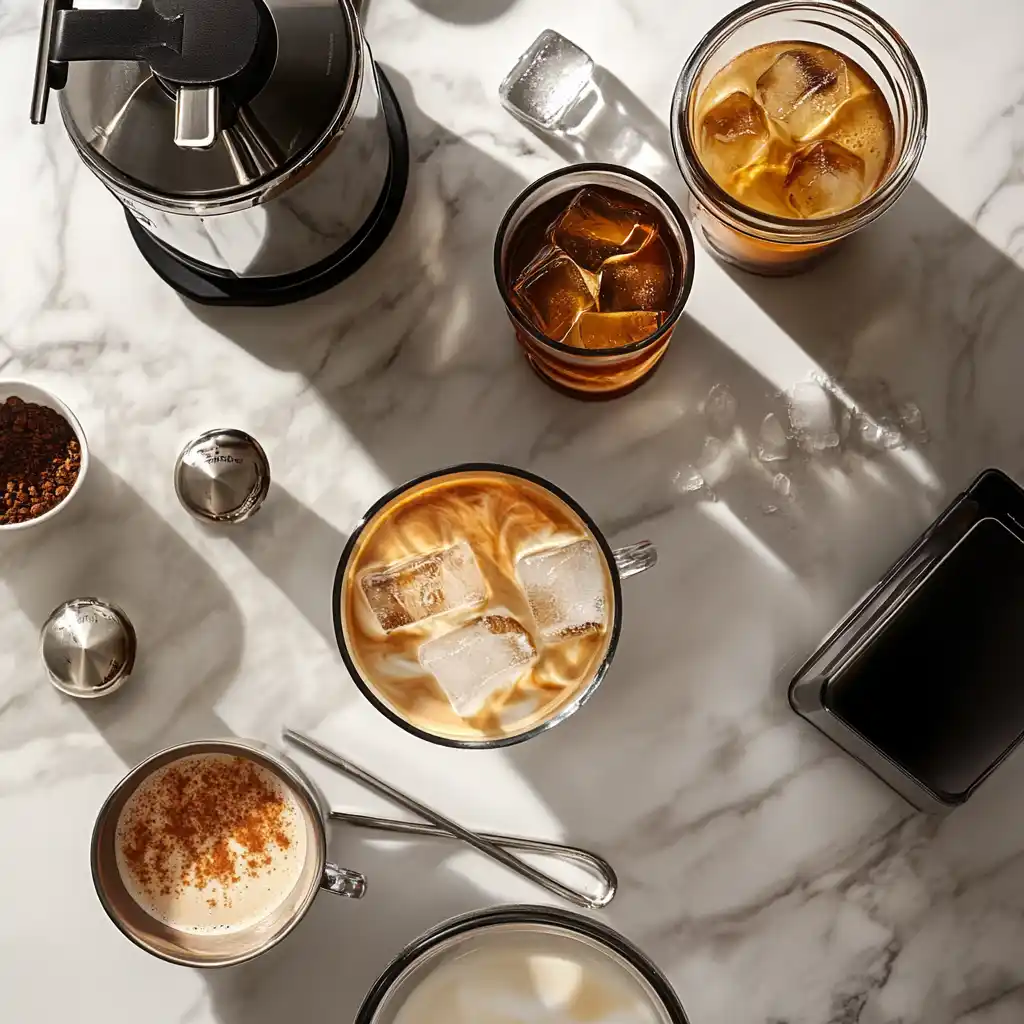
Ingredients You Need for the Perfect Iced Coffee
Choosing the Right Coffee Beans and Roast Types
The quality of your iced coffee starts with the coffee itself. While you can use any roast, the best results come from medium to dark roasts. These offer a richer, more balanced flavor that holds up well when chilled and diluted with ice.
Here’s a quick guide:
| Roast Type | Flavor Profile | Best For |
|---|---|---|
| Light Roast | Bright, acidic, fruity | Not ideal – too delicate |
| Medium Roast | Balanced, nutty, smooth | Excellent for classic iced style |
| Dark Roast | Bold, chocolaty, slightly bitter | Great with milk and sweeteners |
Whole beans are ideal if you’re grinding at home, but pre-ground coffee works too. Just be sure to store it in an airtight container to preserve freshness.
Milk, Sweeteners, and Flavor Options
Once your coffee is brewed, what you add to it is where the fun begins. There’s no single right way—just the way you like it.
Popular add-ins for iced coffee:
| Type | Options | Flavor Impact |
|---|---|---|
| Milk | Whole, skim, half-and-half, oat, almond | Creamy or nutty texture |
| Sweeteners | Sugar, honey, maple syrup, stevia | Adds sweetness, balances bitter |
| Syrups | Vanilla, caramel, mocha, hazelnut | Flavored café-style drinks |
| Extras | Cinnamon, nutmeg, cocoa powder | Spices up the experience |
For a barista-style twist, try blending in cold foam or topping it with whipped cream and a drizzle of flavored sauce.
Pro Tip: Make Coffee Ice Cubes
Freeze leftover coffee into ice cubes. This keeps your drink from watering down and enhances the coffee flavor as the ice melts. It’s one of the easiest upgrades you can make to your daily brew.
Pair your morning iced coffee with this high-protein egg salad sandwich for a perfect start
Best Iced Coffee Recipes to Try Today
Classic Iced Coffee with Cream
This traditional favorite is easy to make, rich in flavor, and totally customizable. It’s the foundation for countless coffee shop drinks—and now you can make it right in your kitchen.
You’ll need:
- Strong brewed coffee (cooled)
- Ice
- Half-and-half or whole milk
- Sugar or syrup (optional)
How to make it:
- Fill a tall glass with ice.
- Pour in about ¾ cup of cooled brewed coffee.
- Add 2–3 tablespoons of cream or milk.
- Stir well. Add sweetener if desired.
- Serve with a straw and enjoy!
This simple version delivers that smooth café experience without the long line. It’s the perfect starting point if you’re new to making iced coffee at home.
Vegan and Dairy-Free Iced Coffee Ideas
You don’t need dairy to enjoy a creamy and satisfying iced drink. There are plenty of plant-based options that blend beautifully with coffee.
Popular dairy-free add-ins:
- Oat milk: Naturally sweet and creamy
- Almond milk: Light and nutty
- Coconut milk: Adds a tropical flavor twist
- Cashew milk: Thick and smooth
Dairy-Free Vanilla Iced Latte Recipe:
- 1 cup strong brewed coffee
- ¼ cup unsweetened almond or oat milk
- 1 tsp vanilla extract or vanilla syrup
- Ice
Shake or stir it all together in a mason jar for a café-style experience without the dairy. Add maple syrup or agave if you like a little sweetness.
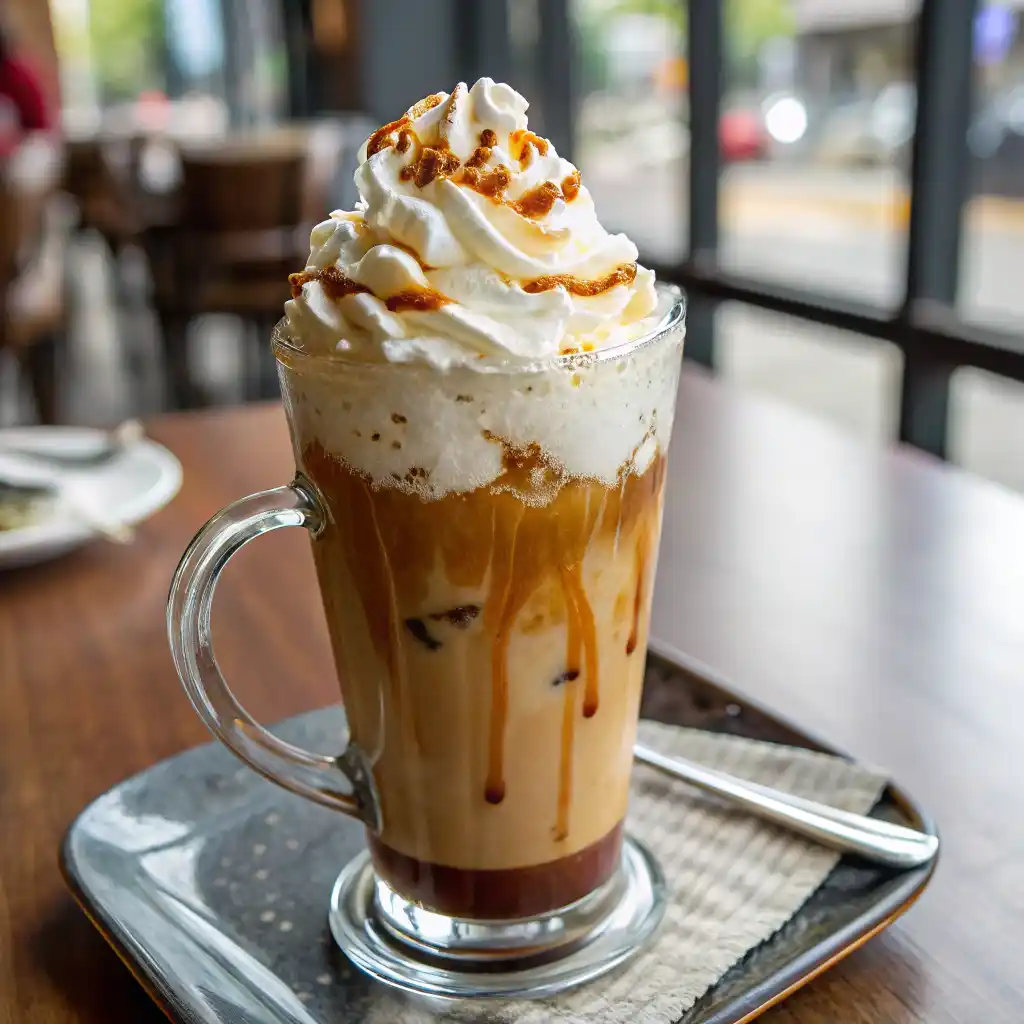
Whether you’re going classic or plant-based, there’s no wrong way to enjoy a chilled cup. You can experiment with spice blends, protein boosts, or even scoop in a bit of ice cream for an affogato-style treat.
Discover great ideas like this broccoli cheese casserole to serve alongside your chilled brew
Pro Tips to Perfect Your Iced Coffee Game
Ice Cube Hacks and Coffee Strength Balancing
Let’s be honest—no one likes watered-down coffee. One of the easiest ways to keep your iced coffee strong and flavorful is by using coffee ice cubes. Just pour leftover brew into an ice tray, freeze, and use those cubes in your next drink. As they melt, they enhance the flavor rather than dilute it.
Another tip: brew your coffee stronger than usual. Use more grounds per cup or cut the water ratio slightly. This compensates for the dilution that naturally happens when hot coffee hits ice.
Pro tip ratio:
- 2 tablespoons of ground coffee per 6 ounces of water.
Also, cool your coffee a bit before pouring it over ice. This prevents instant melt and maintains flavor concentration.
Brewing Techniques That Impact Flavor
Not all brewing methods are created equal—each one produces a different flavor and mouthfeel. Choosing the right technique can make or break your iced drink.
Here’s a quick breakdown:
| Method | Flavor Notes | Ideal For |
|---|---|---|
| Drip Brew | Balanced, clean, familiar | Everyday coffee lovers |
| French Press | Bold, full-bodied | Rich and strong iced recipes |
| Espresso | Intense, concentrated | Iced lattes, coffee shots over ice |
| Cold Brew | Smooth, low acid, mellow | Make-ahead prep and batching |
| Instant | Fast, light, slightly bitter | Convenience, quick mixes |
Experiment with brew times and grind sizes. A finer grind in a French press, for instance, will increase extraction and deepen the flavor—great for a cream-heavy drink.
For those who want a sweeter profile, try brewing with cinnamon, cardamom, or nutmeg in your grounds. These subtle flavors pair beautifully with milk and syrups.
Health Benefits and Concerns of Drinking Iced Coffee
Nutritional Value and Caffeine Content
Iced coffee isn’t just about taste—it can also offer some surprising health benefits, depending on how you prepare it. When made without loads of cream or sugary syrups, it’s a low-calorie beverage that delivers a solid energy boost and even some antioxidant power.
Here’s what you’re typically getting in an 8-ounce serving of plain iced coffee:
| Nutrient | Approximate Amount |
|---|---|
| Calories | 2 (black coffee only) |
| Caffeine | 80–120 mg |
| Sugar | 0g (without additives) |
| Fat | 0g (if no cream) |
Caffeine can help improve focus, mood, and even performance in workouts. Coffee also contains polyphenols—compounds that may support heart and brain health.
Want a healthier version? Skip sugary creamers and opt for oat milk or unsweetened almond milk. Add flavor with cinnamon or a dash of pure vanilla extract.
Side Effects and Who Should Avoid It
As with any caffeinated drink, moderation is key. While most people tolerate iced coffee just fine, some may experience side effects if they consume too much.
Possible concerns:
- Jitters or restlessness: Too much caffeine too quickly.
- Stomach irritation: Especially if consumed on an empty stomach.
- Sleep disruption: Avoid drinking late in the day.
Also, watch out for high-calorie blends from coffee shops. A “flavored” iced latte with whipped cream and syrup can have 300+ calories and 40g of sugar in one serving.
Who should be cautious:
- Pregnant individuals (limit caffeine intake to 200 mg/day)
- People with acid reflux or sensitivity to caffeine
- Those managing blood sugar or on certain medications
Check out this protein-packed Moroccan lamb meatball recipe for your next meal prep
By making your own version at home, you can control what goes in—and keep your drink aligned with your health goals.
Iced Coffee vs Cold Brew – What’s the Real Difference?
Taste, Brewing Time, and Equipment Needed
At first glance, iced coffee and cold brew may seem like the same drink—they’re both served cold and often in the same cup. But they’re brewed completely differently, and the result is a distinct flavor, strength, and texture.
Let’s break it down:
| Feature | Iced Coffee | Cold Brew |
|---|---|---|
| Brewing Method | Hot brew cooled over ice | Steeped in cold water for 12–24 hours |
| Time Required | 5–10 minutes | 12 to 24 hours |
| Flavor Profile | Bold, slightly acidic | Smooth, mellow, lower acidity |
| Caffeine Level | Moderate to high (depends on brew) | Often higher (concentrated ratio) |
| Equipment Needed | Any standard coffee maker | Cold brew maker, mason jar, or pitcher |
Iced coffee gives you that traditional flavor most people expect from a hot brew—it just happens to be served cold. Cold brew, on the other hand, is known for its naturally sweet, less acidic finish and is often stronger when served undiluted.
Which One Should You Choose?
Choose iced coffee if:
- You want it fast
- You enjoy the sharper taste of hot-brewed coffee
- You’re adding milk, cream, or syrups (its boldness holds up)
Go for cold brew if:
- You prefer a smooth, sweet finish
- You like prepping ahead in batches
- You’re sensitive to acidity or stomach upset
There’s no winner here—just what suits your preference and routine. Some coffee lovers even rotate between the two depending on the season, time of day, or flavor cravings.
Popular Iced Coffee Variations from Around the World
Vietnamese Iced Coffee (Cà Phê Sữa Đá)
One of the most popular international versions, Vietnamese iced coffee is known for its bold, rich taste and indulgent sweetness. It’s traditionally made using dark roast coffee and a metal drip filter known as a phin.
Here’s how it’s made:
- 2 tablespoons of dark roast ground coffee
- 2–3 tablespoons of sweetened condensed milk
- Ice
Instructions:
- Place sweetened condensed milk in the bottom of a glass.
- Brew hot coffee directly into the glass using a phin or any slow-drip method.
- Stir well once brewed, then pour over a tall glass of ice.
The result is a creamy, intensely flavored drink that balances sweetness with strong coffee character.
Japanese Flash Brew & Greek Frappe
Japanese flash brew is another unique method that starts hot but is quickly chilled during brewing. Hot water is poured over fresh grounds directly onto ice, locking in the aroma and preventing oxidation.
Flash Brew Method:
- Brew ratio: 60% hot water, 40% ice
- Use pour-over or Chemex-style dripper
- Results in bright, flavorful, aromatic iced coffee
This method preserves complexity while keeping the drink crisp and clean.
Greek frappe, on the other hand, uses instant coffee to create a frothy, foamy cold beverage. It’s extremely popular during hot Mediterranean summers.
Greek Frappe Recipe:
- 2 teaspoons instant coffee
- 2 teaspoons sugar (optional)
- 2–3 tablespoons cold water
- Ice
- Cold water or milk to fill the glass
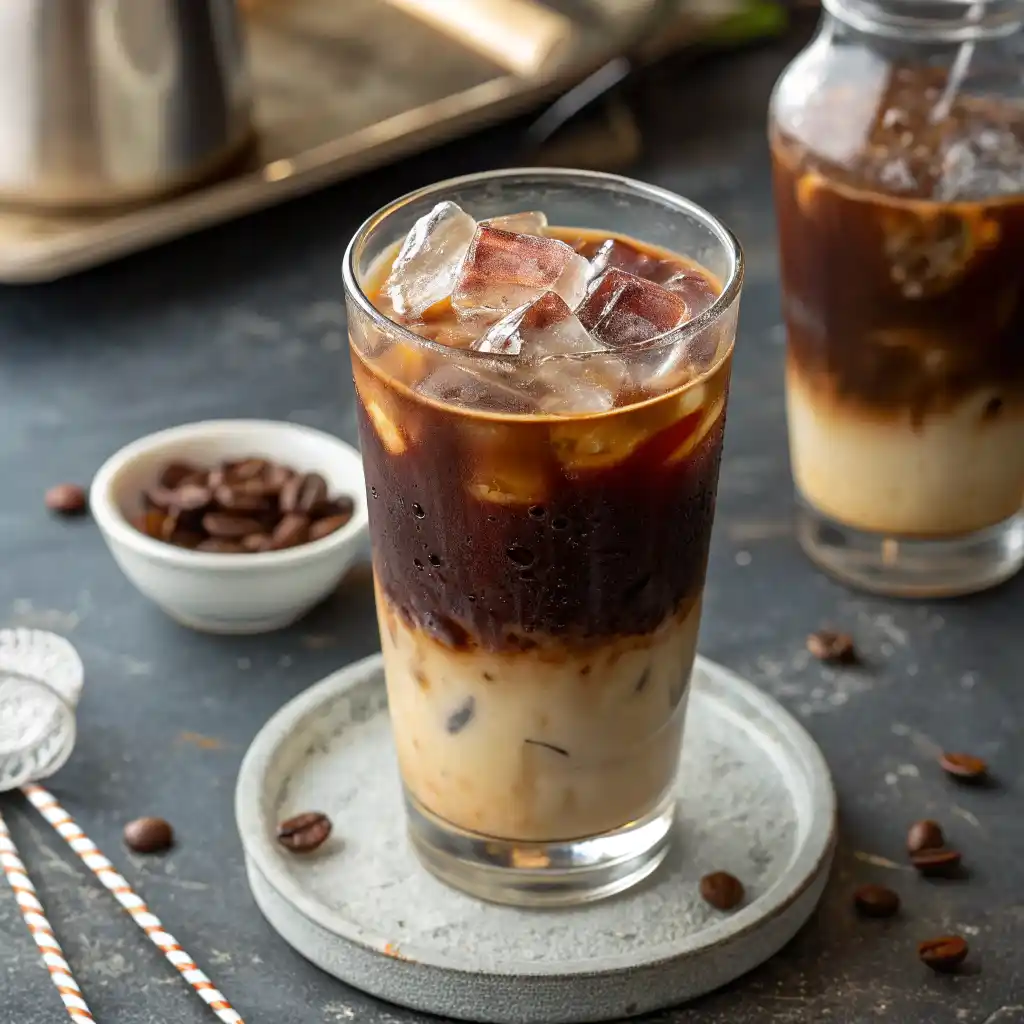
Shake the coffee, sugar, and a splash of water in a jar until frothy. Pour over ice and top with more water or milk. Light, airy, and refreshing—it’s a vacation in a cup.
Don’t miss our healthy chicken stir-fry if you’re craving a full meal with your iced drink
Best Tools and Gear for Making Iced Coffee
Recommended Coffee Makers, Grinders, and Frothers
You don’t need fancy gadgets to make great iced coffee, but the right tools can make the process faster, smoother, and more flavorful. Here are some tried-and-true essentials that every home brewer should consider:
| Tool | Why It’s Useful | Best For |
|---|---|---|
| French Press | Full-bodied brew with minimal equipment | Strong, bold iced drinks |
| Cold Brew Maker | Simplifies steeping and filtering | Smooth, low-acid cold coffee |
| Pour-Over Dripper | Controls brewing time and saturation | Flash brews, complex flavors |
| Espresso Machine | Produces intense shots quickly | Iced lattes, café-style drinks |
| Burr Grinder | Even grind size for better extraction | Any brewing method |
| Milk Frother | Adds creamy, airy texture to cold drinks | Homemade cold foam or lattes |
Manual coffee grinders offer portability, while electric burr grinders are great for consistent texture. If you’re using milk alternatives or love frothy finishes, a handheld frother is an affordable upgrade.
Must-Have Accessories for Iced Coffee Lovers
Want to feel like a barista at home? These accessories make your iced drinks taste better and look amazing.
Top accessories:
- Glass mason jars or insulated tumblers: Ideal for serving and keeping drinks cold longer
- Silicone ice cube trays: Make large or shaped cubes to slow melting
- Reusable stainless-steel straws: Eco-friendly and perfect for cold beverages
- Flavored syrup set: Vanilla, caramel, hazelnut, and seasonal options
- Cold brew filter bags: Mess-free brewing in mason jars or pitchers
With the right setup, you’ll find yourself skipping the café more often and saving money too. Plus, it’s satisfying to tweak and perfect your own blend right at home.
Frequently Asked Questions About Iced Coffee
How do you make iced coffee?
What is an iced coffee?
What to put in iced coffee?
Milk or non-dairy alternatives (like oat, almond, or coconut milk)
Sweeteners (sugar, honey, maple syrup)
Flavored syrups (vanilla, hazelnut, caramel)
Spices (cinnamon, nutmeg, cocoa powder)
Cold foam or whipped cream for a café-style finish
For a dessert twist, top it with ice cream or blend it into a frappe.
Is iced coffee just cold coffee with ice?
Explore more healthy food and drink ideas on our main blog homepage
Conclusion: Chill Out With the Perfect Iced Coffee at Home
Whether you love it bold and black, sweet and creamy, or topped with frothy oat milk, iced coffee is one of the most customizable drinks you can enjoy at home. Now that you’ve explored its origins, brewing methods, global variations, and essential tools, you’re ready to master your own cold coffee creations.
With just a few ingredients and the right technique, you can ditch expensive café drinks and enjoy something fresher and more satisfying at home. So grab your favorite roast, load up your ice tray, and experiment with different combos until you find your perfect cup.
Looking for savory dishes to pair with your coffee break? Don’t miss these easy lamb meatballs
Print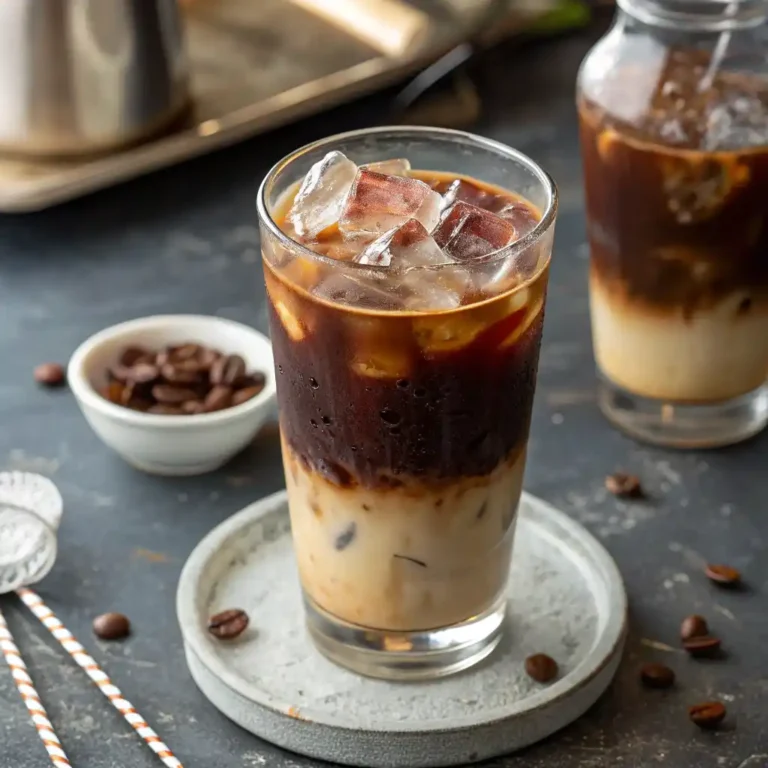
Iced Coffee
A bold, refreshing coffee drink brewed hot and chilled over ice—perfect for warm days and endlessly customizable.
- Total Time: 10 minutes
- Yield: 1 serving
Ingredients
-
1 cup freshly brewed hot coffee (strong)
-
½ cup ice cubes
-
¼ cup milk or non-dairy alternative (optional)
-
1–2 tsp sugar or flavored syrup (optional)
Instructions
-
Brew your coffee using drip, pour-over, French press, or instant method.
-
Let it sit 3–5 minutes to cool slightly.
-
Fill a glass with ice.
-
Add sweetener to warm coffee if using sugar.
-
Pour coffee over ice.
-
Stir in milk or flavoring if desired.
-
Serve immediately and enjoy.
Notes
Try freezing leftover coffee into ice cubes to avoid dilution and boost flavor. Medium to dark roasts work best for iced coffee.
- Prep Time: 5 minutes
- Cook Time: 5 minutes
- Category: Beverage
- Method: Brewed & Chilled
- Cuisine: American

